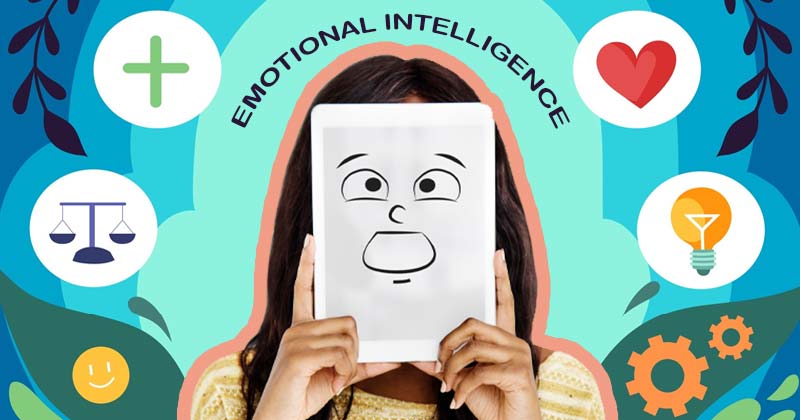
Emotional Intelligence Test
Looking to uncover your Emotional Quotient (EQ)? In today's fast-paced world, success isn't just about IQ or technical skills; it's also about how well you understand and manage emotions—both yours and others'.
Unlike traditional IQ tests that focus solely on cognitive abilities, our emotional intelligence test delves into the intricate realm of emotions and interpersonal skills. Understanding emotional intelligence is just as crucial as recognizing other forms of intelligences in navigating the complexities of human interactions and personal growth.
But what exactly is EQ, and why does it matter? Let's dive in and explore the fascinating world of emotional intelligence together!
What is Emotional Intelligence?
Imagine you're faced with a challenging situation at work—a tight deadline, conflicting opinions, and mounting pressure. How do you react? Do you let stress consume you, or do you calmly navigate through the chaos? This ability to recognize, understand, and manage your emotions is at the core of emotional intelligence.
Emotional intelligence, often referred to as EQ, is the capacity to be aware of, control, and express one's emotions, and to handle interpersonal relationships judiciously and empathetically. In essence, it's about how well you understand yourself and others, and how effectively you can navigate the complexities of human interactions.
Why Does EQ Matter?
In today's interconnected world, where collaboration and communication are key, EQ plays a pivotal role in personal and professional success. Research has shown that individuals with higher levels of emotional intelligence tend to excel in various areas of life, including:
- Leadership: Effective leaders are not just knowledgeable; they also possess strong interpersonal skills and emotional intelligence. They inspire trust, motivate their teams, and navigate through challenges with resilience and empathy.
- Relationships: Whether it's with family, friends, or colleagues, healthy relationships are built on mutual understanding, respect, and empathy. People with high EQ forge deeper connections and navigate conflicts more constructively.
- Career Success: In the workplace, EQ can be the determining factor for career advancement. From effectively managing teams to resolving conflicts and negotiating, individuals with high emotional intelligence thrive in diverse professional settings.
- Mental Well-being: Emotional Intelligence isn't just about how we interact with others—it's also about how we relate to ourselves. People with higher EQ tend to have better mental health, as they are more adept at managing stress, coping with challenges, and maintaining a positive outlook.
Now that you understand the significance of emotional intelligence, it's time to embark on a journey of self-discovery with our interactive quiz! This free test is designed to appraise various aspects of your emotional intelligence and provide valuable insights into your strengths and areas for growth.
How Does the Quiz Work?
Our quiz consists of a series of thought-provoking questions, each designed to explore different facets of emotional intelligence. From how you handle stress to your ability to empathize with others, these questions will paint a holistic picture of your EQ.
For each question, you'll be presented with multiple-choice answers. Choose the option that best reflects your thoughts, feelings, and behaviors in the given scenario. Remember, there are no right or wrong answers—this quiz is all about gaining self-awareness and understanding.
What Can You Expect?
At the end of the quiz, you'll receive a personalized result based on your responses. Whether you fall into the category of Low Emotional Intelligence or Exceptional Emotional Intelligence, each result will provide detailed insights into your emotional strengths and areas for improvement.
But that's not all! Along with your result, you'll also receive actionable tips and suggestions on how to further develop your emotional intelligence. Whether it's practicing mindfulness, improving communication skills, or nurturing empathy, these tips will empower you to embark on a journey of personal growth and self-improvement.
Ready to Unlock Your Emotional Intelligence?
So, are you ready to embark on this enlightening journey to uncover your Emotional Intelligence? Whether you're a seasoned EQ genius or just starting to explore the world of emotions, this quiz promises to offer valuable insights and guidance for personal and professional development.
Get ready to discover the power of Emotional Intelligence and unlock your full potential! Let's dive in and explore the fascinating realm of EQ together!
Enjoy Quizly? Upgrade to Premium for an ad-free experience and exclusive features.
Get PremiumEmotional Intelligence Test Questions
Let the quiz begin! How do you approach new challenges?

None of these
I feel intimidated and avoid them.
I feel excited and motivated to conquer them.
I cautiously assess them before deciding to tackle them.
I embrace them as opportunities for growth.
I dive in headfirst without much thought.
How do you approach social situations?

I enjoy socializing and meeting new people.
I prefer small, intimate gatherings over large crowds.
I adapt easily to different social settings and personalities.
I feel anxious in social situations but try to push through.
I feel uncomfortable and avoid social interactions.
None of these
How do you approach conflicts in relationships?

I tend to get defensive and blame the other person.
I confront conflicts head-on and try to find a resolution.
I compromise and try to find a middle ground.
I withdraw emotionally and shut down.
I avoid conflicts at all costs.
How do you approach decision-making?

I seek advice from others before making a decision.
I weigh the pros and cons before making a decision.
I struggle to make decisions and often feel indecisive.
I avoid making decisions altogether.
I trust my instincts and make decisions quickly.
None of these
How do you handle change?

I become anxious and resistant to change.
None of these
I seek support from others to navigate change.
I cautiously approach change, taking time to adjust.
I struggle to adapt and prefer stability.
I embrace change as an opportunity for growth.
How do you react to someone else's success?

I compare myself to them and feel inadequate.
I feel envious and resentful.
I use their success as motivation to work harder on my own goals.
I pretend to be happy for them but secretly feel jealous.
I genuinely feel happy for them and celebrate their achievements.
None of these
How do you express your emotions?

I express my emotions openly and honestly.
None of these
I tend to hide my true emotions from others.
I struggle to express my emotions and keep them bottled up.
I express my emotions in a controlled manner.
I express my emotions through creative outlets like art or music.
When faced with a difficult situation, how do you typically react?

I become defensive or lash out.
None of these
I become overwhelmed and struggle to think clearly.
I seek support from friends or loved ones to help me cope.
I try to stay calm and think through the problem logically.
I take a step back to assess my emotions before responding.
How do you approach self-reflection?

I regularly journal or meditate to explore my inner thoughts.
I often dwell on negative thoughts without finding solutions.
None of these
I reflect on my experiences when faced with challenges.
I rarely take the time to reflect on my thoughts and feelings.
I rely on feedback from others to understand myself better.
Imagine you're in a group project and a team member is not pulling their weight. How do you handle the situation?

I take on their responsibilities to ensure the project is completed successfully.
I avoid conflict and hope someone else will address the issue.
I confront the team member directly and express my concerns.
I express my frustration to other team members but don't address it directly with the individual.
I try to understand their perspective and offer support or guidance.
Here's the halfway point! How do you react to failure?

I blame external factors for my failures.
I feel defeated and give up easily.
I feel embarrassed and avoid discussing it.
I view failure as a learning opportunity and try again.
I analyze what went wrong and make adjustments.
How do you respond to someone else's emotional distress?

I offer support and try to understand their perspective.
I feel uncomfortable and don't know how to respond.
I feel overwhelmed and avoid the situation.
I try to distract them or change the subject.
I listen attentively and offer empathy.
How do you handle stress?

I internalize my stress and try to push through.
I use healthy coping mechanisms like exercise or meditation.
I become easily overwhelmed and struggle to cope.
I turn to unhealthy habits like binge eating or drinking.
I seek support from friends or loved ones.
None of these
How do you handle disappointment?

I acknowledge the disappointment and look for silver linings.
I pretend everything is fine and suppress my disappointment.
I discuss my feelings with someone I trust.
I dwell on the disappointment and struggle to move on.
I try to distract myself from the disappointment.
How do you prioritize self-care?

I neglect self-care and prioritize other responsibilities.
None of these
I make time for self-care activities regularly.
I struggle to find time for self-care amidst other obligations.
I prioritize self-care only when I'm feeling overwhelmed.
I incorporate self-care into my daily routine.
How do you respond to feelings of jealousy?

I become consumed by jealousy and struggle to control my emotions.
I confront the person or situation that triggers my jealousy.
I try to focus on my own accomplishments and strengths.
I acknowledge my feelings of jealousy and try to understand their root cause.
I suppress my feelings of jealousy and pretend everything is fine.
How do you handle uncertainty?

I try to seek clarity and control over uncertain situations.
I embrace uncertainty as a natural part of life.
I avoid uncertain situations whenever possible.
I feel anxious and stressed when faced with uncertainty.
I adapt and go with the flow in uncertain times.
You receive unexpected praise for your work. How do you react?

I feel suspicious of the praise and wonder what the person's motives are.
I feel uncomfortable with the attention and deflect the praise.
I feel validated by the recognition and motivated to continue performing well.
I downplay my achievements and attribute them to luck or other factors.
None of these
I graciously accept the praise and express gratitude.
You receive a promotion at work, but some of your colleagues seem resentful. How do you handle the situation?

I feel guilty and try to downplay my achievement to make others feel better.
I become defensive and try to prove myself even more.
I continue to work hard and show appreciation for my colleagues' efforts.
I discuss their concerns with them directly and try to address any misunderstandings.
I ignore their behavior and focus on my new responsibilities.
We're coming to a close! You receive criticism from a friend about your behavior. How do you respond?

I thank them for their honesty and reflect on their feedback.
I confront them about their criticism and defend my actions.
I become defensive and dismissive of their feedback.
I feel hurt by their criticism and withdraw from the friendship.
I listen to their feedback and try to understand their perspective.
Last but not least, you're running late for an important meeting. How do you handle the situation?

I prioritize arriving on time and adjust my schedule accordingly.
I brush it off and arrive late without acknowledging the impact.
I make excuses for my lateness and downplay its importance.
I panic and stress about being late.
I apologize and communicate with the meeting organizer about my lateness.







19 Comments
I got: High EQ!
Congratulations! You possess a high level of emotional intelligence, indicating that you have a strong understanding of emotions, both yours and others’, and are skilled at managing and expressing them effectively. Your ability to navigate challenging situations with empathy and self-awareness makes you an asset in personal and professional relationships. You excel in communicating your feelings, resolving conflicts, and building meaningful connections with others. Your emotional intelligence not only contributes to your success but also enhances your overall well-being and satisfaction in life.
Tips:
Continue to cultivate self-awareness through practices such as mindfulness and reflection.
Use your emotional intelligence to build and maintain positive relationships with those around you.
Practice active listening and empathy to better understand the emotions and perspectives of others.
Serve as a role model for emotional intelligence by demonstrating empathy, resilience, and effective communication.
Seek out leadership opportunities where you can leverage your emotional intelligence to inspire and motivate others.
yeah bro so true but ot in exams
High EQ
Yeah, most of my fam has low, so I have to keep them informed ;), and I LOVE people
You got: High EQ
Yup, I know.
I got: Low EQ!
not suprised
High EQ
I have a low EQ
Developing eq
High EQ. Me? Seriously?
I know, right? I got the same thing! You are not alone!
High EQ
High EQ.
This is surprising as I don’t care about others.
you should if you want the same to you what goes around comes around
I got Highest EQ. Am I the only one?
High EQ
High EQ l never thought l would get this
Low EQ. I knew I would get something like that.
Hey there, I just saw this. I noticed from your other comments that you’re quite young, so this test might not be very accurate for you. These quizzes are just for fun, and the results aren’t meant to define you! Take it with a pinch of salt (a large pinch in your case as you’re very young) and enjoy discovering new things in life along the way!
Oof
THANKS!!!😊😊👍